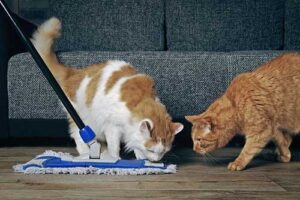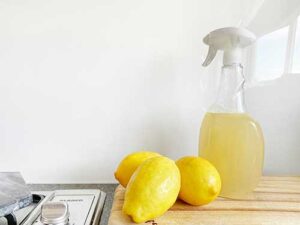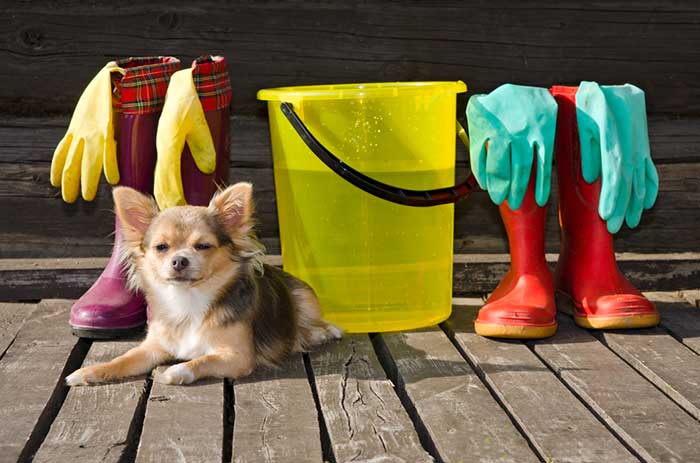Keeping our homes clean is a top priority for many pet owners, but it’s important to consider the safety of the cleaning products we use around our furry friends. Many common household cleaners contain harsh chemicals that can be harmful, or even deadly, to pets. From floor cleaners to air fresheners, the products we rely on to keep our homes spotless may be putting our pets at risk. In this post, we’ll explore the dangers of using common household cleaners around pets and offer safe, pet-friendly alternatives. We’ll also touch on how these safer choices tie into a broader commitment to natural pet care.
The Dangers of Common Household Cleaners
Many traditional cleaning products contain chemicals that can be hazardous to pets. These chemicals can cause a range of health issues, from mild skin irritations to severe poisoning. Here are some of the most common and dangerous chemicals found in household cleaners that pet owners should be aware of:
Ammonia
 Ammonia is a powerful cleaning agent found in many glass cleaners, oven cleaners, and surface cleaners. While it’s effective at cutting through grease and grime, it’s also highly toxic to pets. Research says that exposure to ammonia can cause respiratory issues, especially in pets with pre-existing conditions like asthma. Inhalation of ammonia fumes can lead to coughing, sneezing, and difficulty breathing. If a pet comes into direct contact with ammonia or ingests it, it can cause burns to their skin, mouth, and digestive tract.
Ammonia is a powerful cleaning agent found in many glass cleaners, oven cleaners, and surface cleaners. While it’s effective at cutting through grease and grime, it’s also highly toxic to pets. Research says that exposure to ammonia can cause respiratory issues, especially in pets with pre-existing conditions like asthma. Inhalation of ammonia fumes can lead to coughing, sneezing, and difficulty breathing. If a pet comes into direct contact with ammonia or ingests it, it can cause burns to their skin, mouth, and digestive tract.
Bleach
Bleach is another common household cleaner that poses significant risks to pets. It’s often found in laundry detergents, toilet bowl cleaners, and disinfectants. While bleach is excellent at killing germs, it’s also highly corrosive and can cause serious harm to pets. Research says that bleach fumes can irritate a pet’s respiratory system, and ingestion of bleach can result in vomiting, diarrhea, drooling, and even life-threatening internal burns.
Phenols
Phenols are chemicals found in many disinfectants and floor cleaners. They are known for their germ-killing properties but are extremely toxic to pets, particularly cats. Research says that phenols can cause liver damage in cats, as their bodies are unable to process these chemicals effectively. Signs of phenol poisoning include drooling, vomiting, lethargy, and difficulty breathing.
Formaldehyde
Formaldehyde is a chemical preservative found in some household cleaners, air fresheners, and disinfectants. It’s classified as a carcinogen and can have severe health effects on both humans and pets. Research says that formaldehyde exposure can cause respiratory issues, skin irritation, and, over time, an increased risk of cancer. Pets are particularly vulnerable to formaldehyde exposure due to their smaller size and closer proximity to treated surfaces.
Glycol Ethers
Glycol ethers are solvents found in some glass cleaners, carpet cleaners, and floor polishes. They are effective at breaking down dirt but are also toxic to pets. Research says that glycol ethers can cause anemia and lung damage in pets, especially with long-term exposure. Symptoms of exposure include lethargy, weakness, and respiratory distress.
Safe, Pet-Friendly Cleaning Alternatives
Given the potential dangers of common household cleaners, it’s important for pet owners to seek out safer, pet-friendly alternatives. These products are made with natural ingredients that are effective at cleaning while being safe for your pets. Here are some safe alternatives to consider:
Vinegar and Baking Soda
A simple mixture of vinegar and baking soda is a powerful, all-natural cleaner that can tackle a variety of household cleaning tasks. Research says that vinegar has antibacterial properties, making it effective for disinfecting surfaces, while baking soda acts as a gentle abrasive to scrub away grime. This combination is safe for pets and can be used on floors, countertops, and even in the laundry.
- Recipe: Mix equal parts white vinegar and water in a spray bottle. For tougher stains, sprinkle baking soda directly on the stain, spray with the vinegar solution, and scrub.
Castile Soap
Castile soap is a natural, vegetable-based soap that is free from synthetic chemicals and harsh detergents. It’s versatile and can be used for everything from washing dishes to mopping floors. Research says that castile soap is safe for pets and can even be used to clean your pet’s bedding and toys.
- Recipe: For an all-purpose cleaner, mix 1/4 cup of castile soap with a quart of warm water. Use it to clean surfaces, floors, and even your pet’s accessories.
Essential Oils (with Caution)
 Some essential oils, such as lavender and chamomile, have natural antibacterial and antifungal properties. They can be used to add a pleasant scent to homemade cleaning products. However, it’s important to use essential oils with caution, as some can be toxic to pets, particularly cats. Research says that when using essential oils around pets, it’s best to stick to small amounts of pet-safe oils and avoid diffusing them in areas where your pets spend a lot of time.
Some essential oils, such as lavender and chamomile, have natural antibacterial and antifungal properties. They can be used to add a pleasant scent to homemade cleaning products. However, it’s important to use essential oils with caution, as some can be toxic to pets, particularly cats. Research says that when using essential oils around pets, it’s best to stick to small amounts of pet-safe oils and avoid diffusing them in areas where your pets spend a lot of time.
- Recipe: Add a few drops of lavender essential oil to your vinegar and water cleaning solution for a fresh scent that’s safe for dogs. Avoid using essential oils around cats unless you’re certain they are safe.
Hydrogen Peroxide
Hydrogen peroxide is a natural disinfectant that can be used to clean and sanitize surfaces without the harsh chemicals found in traditional cleaners. Research says that hydrogen peroxide is safe for pets when diluted properly and can be used to clean food and water bowls, litter boxes, and other pet areas.
- Recipe: Mix one part hydrogen peroxide with three parts water in a spray bottle. Use it to disinfect surfaces, but be sure to let it dry completely before allowing your pet to come into contact with the area.
Steam Cleaning
Steam cleaning is an excellent chemical-free way to clean and disinfect surfaces, floors, and even upholstery. The high heat from the steam effectively kills bacteria, viruses, and mold without the need for any chemicals. Research says that steam cleaning is safe for pets and is particularly effective for cleaning pet bedding, carpets, and furniture.
- Method: Use a steam cleaner according to the manufacturer’s instructions. Steam clean surfaces where your pet spends time to remove dirt, bacteria, and allergens without exposing them to harmful chemicals.
Tying It All Together: Natural Pet Care
Choosing safe, pet-friendly cleaning products is just one part of a broader commitment to natural pet care. By opting for natural, chemical-free cleaning solutions, you’re not only protecting your pet from harmful toxins but also creating a healthier living environment for everyone in your home.
Additionally, this approach aligns with the broader trend of natural pet care, which includes feeding your pet a balanced, natural diet and using natural grooming products. Research says that pets exposed to fewer chemicals in their diet, environment, and grooming routine tend to have fewer health issues and live longer, happier lives.
Final Thoughts
As pet owners, it’s our responsibility to create a safe and healthy environment for our furry friends. By avoiding harsh chemicals in household cleaners and opting for natural, pet-friendly alternatives, we can reduce the risk of health issues and ensure our pets live their best lives.
Research says that the benefits of using safe cleaning products extend beyond just your pet’s health—they contribute to a cleaner, greener home for everyone. So the next time you reach for a cleaning product, take a moment to consider its impact on your pet and choose a safer, more natural option.
By making these small changes, you’ll be taking an important step toward a more natural, holistic approach to pet care, ensuring that your home is a haven for both you and your pets.


